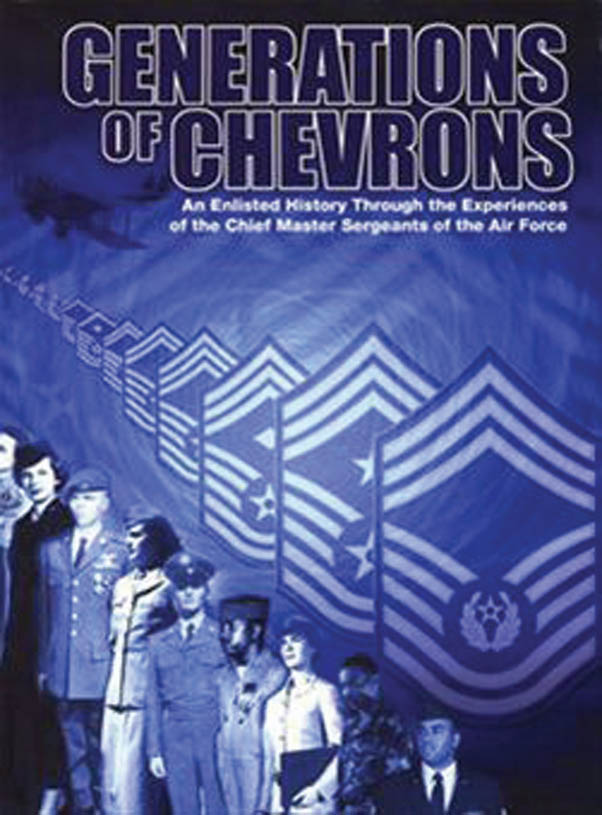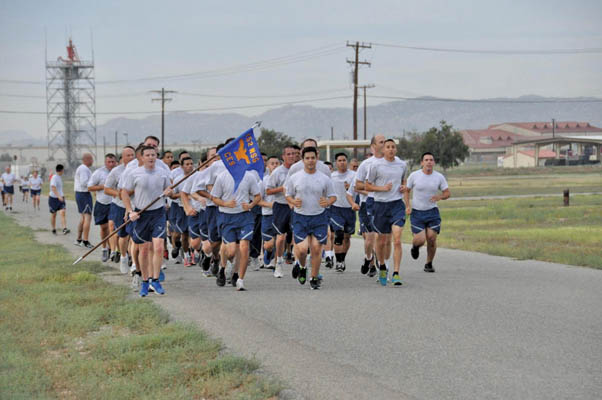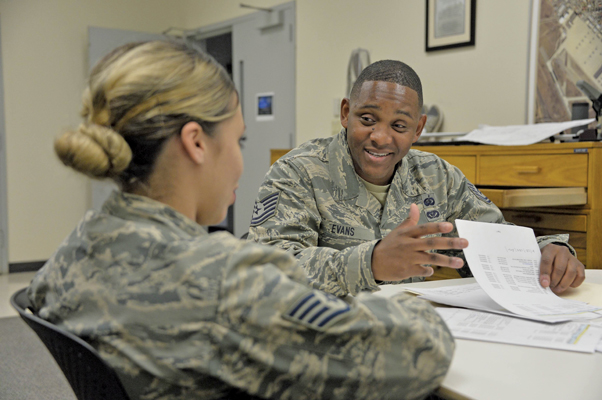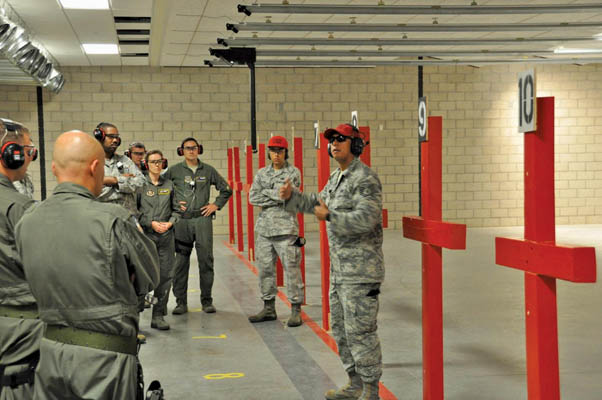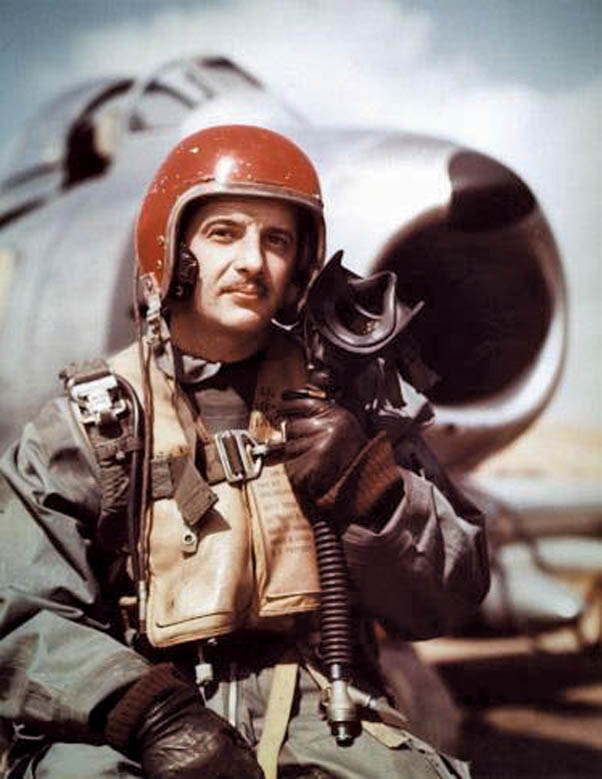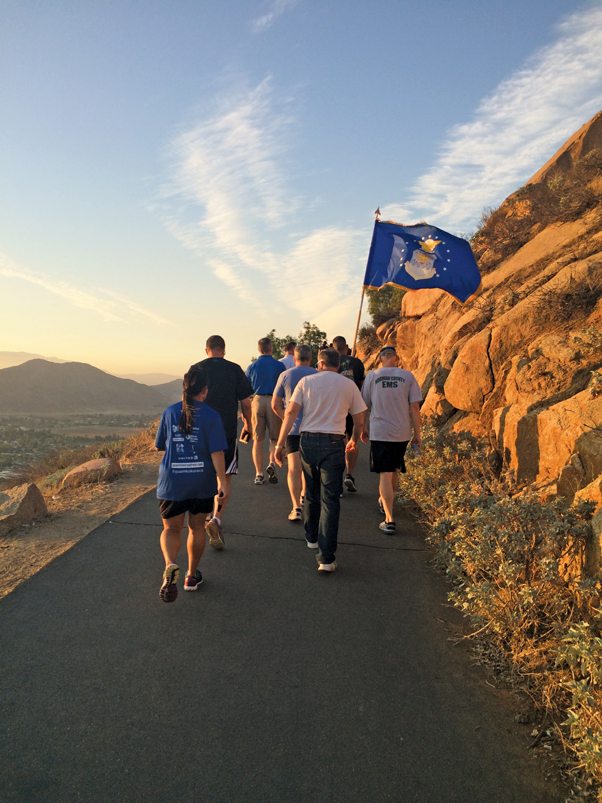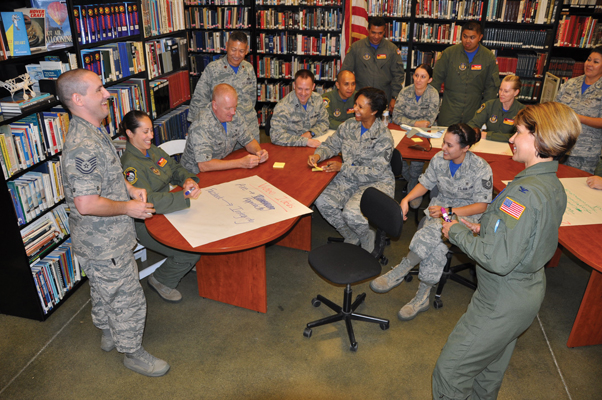We live in the dawn of the Information Age. As military members we have seen throughout history the various stages of development for the betterment of mankind. As each major Age takes place, we see the end results of better technology, food production methods, and our ability to defend ourselves with more advanced weaponry.
Today’s enlisted member has more opportunities available for personal growth and development than in any time in history. The landmark Post 9/11 GI Bill is one of the greatest tools an Enlisted person has in their arsenal for personal education. Emulating the Post WWII Gi Bill of our forefathers returning from European campaign, the Post 9/11’s greatest strength is its versatility. The fact that there is a BAH allowance eases the financial burden of trying to pay for living expenses while in school, particularly for young families.
I enlisted in the Air Force in 1998. Like all Airmen, I proudly marched at Lackland, carried 341s (and sometimes lost them to a sharp eyed TI). I was fortunate enough to be stationed at Barksdale for my entire enlistment. During this time, I developed the work ethic that would help me in my future endeavors even when things got rough.
I studied good leaders, emulated their work habits, and either went to school off duty or worked a second job. The end result? After one enlistment, I had a Bachelor’s degree, an Associate’s and a CCAF. I was able to apply both to OTS and the FBI. Despite not being selected, it was a great stepping stone towards future endeavors.
Today at 38, I’m a Technical Sergeant in a Reserve Squadron in Riverside. I completed a Doctorate in Education, own a life coaching company, Blue Dragon Enterprises, that I started for 100 dollars and just released my seventh book. I run about 20 miles a week and give life counseling to those that need it.
You have the ability to accomplish far more than I ever have. You have advantages that I never had, and once you read the following section, you will have the potential to elevate yourself to new levels of success and leadership that you never thought possible.
I am going to share with you five tenets for your development as an enlisted member.
1. Learn to Network
I wish I had capitalized on this years ago. Networking is like creating your own army of people that are instrumental towards your success. After reading Win Friends and Influence People, which may be the best book I have ever read, I improved my interpersonal communications greatly and capitalized on the power of a group of people. I have friends that help me print t shirts, find me clients, promote my book, and offer suggestions for success.
As an enlisted person, you have an enormous network to draw from. Co workers, Supervisors, Families of fellow vets, the list is endless. If I had been more knowledgeable, I would have started my company while Active Duty because I had so many people I encountered on base daily. Here are some networking tips.
A. Get business cards that are professional, specific, and have your contact info. Vistaprint is the best company I have found so far.
B. When meeting someone new, give them a firm handshake and observe the small details about them. It’s a time honored principle that a person’s favorite talking point is themselves, so ask questions and pay attention.
C. When you meet someone new, find out their hobbies, interests, job, and listen VERY carefully for anything they may need help with. If you can provide this, without being asked, that person will want to keep you around for a very long time.
D. Remember people’s first names. It’s a huge compliment when you remember who someone is after a period of time.
E. Remember that every person you meet has a skill or ability, and a want. People are assets and you must be prepared to equally be an asset to them. Always give more than you take.
2. Be the Standard
Remember what it was like to be in the last week of Basic Training? You were looked upon by new recruits as the absolute standard, the person who had achieved the ultimate pinnacle of discipline and achievement. You were squared away, probably in the best shape of your life and more confident than you had ever been. You walked with pride and probably gave some hope to some 1st week recruit that was terrified.
Are you still that person?
Are you the Soldier, Sailor, Airman or Marine that could appear on a recruiting poster? Are you 1st Sergeant Material? If not, maybe its time to revisit what makes a person be average and what makes them the standard by which others are held to.
A. Work Performance
The average troop will show up at work in a questionable looking uniform, and do what is asked while thinking of the weekend. They will look at their professional development as a waste of time, and devote more time thinking about lunch than the shared vision of the Flight Commander, First Sergeant, E-9, and other leadership.
The troop that strives to be the Standard will show up early, with a haircut, and the materials needed that resemble a business professional: Pen, Pencil, Notebook, Day Planner, Calculator and Weekly Schedule of Events, Training, and Work. They will have firsthand knowledge of the current events within their unit, and will have a good rapport with all coworkers.
The troop that strives to be the best will know exactly what the standards of their Enlisted Performance report entails, and will be a forward thinker, and aggressive performer. Show me an Enlisted member in the front row of a Commander’s briefing taking notes furiously, and Ill show you a person that is on the fast track to success.
B. Physical Fitness
A 2009 report compiled by a Washington D.C nonprofit states that 75% of young people are unfit to serve based on obesity, test scores, drug use…etc. This means that 3 of 4 people will never have the privilege of wearing the uniform. Appreciate and honor the fact that your country has granted you passage to the enlisted ranks. No matter what branch of service, you have a duty to keep a regular fitness routine going, even off duty.
Ever seen someone that has let themselves go? The uniform is a bit tight; they look sloppy, unkempt, and unprofessional. I can understand if you have surgery or a medical condition, but for the most part, if you are healthy and completely ambulatory, you have no excuse for not maintaining your weight.
A regular fitness routine will keep your self esteem healthy, add years to your life, and reduce your chances of heart disease, stroke, diabetes, and many forms of cancer.
The best way I found to gradually improve my diet is to reduce flour intake. Run three times a week and do a long run on Saturdays. I eat five small meals a day and incorporate foods like unsalted almonds, tomatoes, pork, tuna, and apples.
The average troop will not start getting serious until about a month before a fitness exam.
The troop that sets the Standard has no worries because they have trained all year.
Need a final push? Print out the US Army Ranger Creed and hang it on your refrigerator. Those are some of the most powerful words I have ever read.
C. Leadership
Leadership is an interesting attribute. Some military members will spend their entire career trying to attain it. Leadership differs from management and the two terms are often confused because their goals are similar. I have known guys in Basic Training that had leadership and I have had supervisors that were in for 22 years that were still figuring it out.
Leadership is the ability to have others follow you without trying.
Management is directly supervising others through orders, and reviewing the results.
See the difference? For the sake of your growth as an enlisted member, your goal should involve becoming an effective manager by DISPLAYING leadership.
By studying famous leaders throughout history, you can see how they have maximized results from their troops. Napoleon Bonaparte was one such leader that reached nearly cult-like status due to his confidence and reputation. Near the end of his military career, he was banished to the Italian island of Elba. It was hoped that he would quietly spend his life in isolation, far away from the newly crowned King Louis XVIII.
Great leaders cannot be so easily suppressed. Napoleon not only escaped with 600 of his most trusted followers, but sailed them to French shores within a month.
Marshall Ney, who was assigned 6000 men, promised to bring Napoleon “back to Paris in a cage.” Upon meeting Napoleons daily growing army, he and his men joined them.
In 2 months, Napoleon had amassed an army of 280,000 men ready to do battle with Europe’s armies. King Louis the XVIII, in fear of his life, fled.
This is but one historical example of what the powers of leadership can create.
This brings us back to the topic of enlisted leadership.
An average leader will bark out vague orders, chastise subordinates in public, and put their own needs ahead of their troops. They will rule by fear, and punish harshly in order to feel powerful.
The leader that sets the Standard will put the welfare of their troops first. They lead from the front and are not abject to small duties when necessary, such as taking out the trash, helping to move furniture, or helping on a group project. I can assure you, when you have mastered leadership, these things will get done, as if by themselves.
The best leaders will know about the families of their lower ranking troops. They will encourage career development and education; they will provide a dynamic and intellectual work environment. They will know when to listen and will only use their rank when necessary to the mission at hand. In my experiences, humility and given respect are the two greatest traits a leader should possess.
Even the lowest ranking member of a unit, squadron, or battalion should study leadership in order to prepare for who they will one day be.
3. Become a SME
Our enlisted ranks have seen many changes in the very conduct of warfighting. Proficiency at your job has never been a more valuable tool for advancement. No matter what your Rate, AFSC, or MOS, your mission as an enlisted person should be the attainment of Subject Matter Expert Status. Think about where you work right now. Are you the “go to” person for a certain subject or work related task? Are you so experienced that you are the first person that is called upon?
That is one of the main differences in the Officer/Enlisted culture. Officers are schooled in the art of Management/Supervision. Enlisted are technical specialists entrusted with the some of the most advanced forms of warfighting technology known to man.
It is a new dawn for the enlisted member. We are now satellite technicians, computer network specialists, nuclear technicians, and sensor operators for Unmanned Aerial Vehicles. Take pride in the fact that your country has spent hundreds of thousands of dollars to train you and give you these skills.
To become a Subject Matter Expert, or SME, one should adopt a series of habits that will help them to be viewed as “the best.”
*Do not memorize technical information, but rather know where to find it. If you have a technical data library of books or an online database at work, spend time becoming familiar with it.
*Keep a small notebook with you at all times to jot down notes or observations. Divide into sections so you don’t end up with an unorganized mess.
*Ask higher ranking members about some of the most challenging work tasks that they have dealt with and the steps they took to solve them. You may gain valuable knowledge.
*Find the most proficient and knowledgeable member in your workplace and take them to lunch. Ask them about what it takes to “get to their level.” Most times they will be so flattered, that they will give you some VERY valuable advice.
*Remember that becoming an expert is 50% hands on experience and 50% technical knowledge. When you acquire both, you will truly be a master of your profession.
Why should you become a SME? You will be given greater opportunities for advancement, will be held to a higher regard by supervisors, and when you decide to leave the military or retire, you will command a far greater earning potential if you are at an expert status.
4. Use Your Benefits
By enlisting in the military, you get certain benefits that are fairly obvious such as commissary privileges, GI Bill, and BAH. There are a few that lie under the surface that can be utilized however. Did you know that the VA can guarantee first time homebuyer loans? Or that Patriot Loans can be used to open a small business?
If you are trying to finish a degree, you can take CLEP and DANTES tests to skip certain lower level courses. They are free to military members. Take the test, if you pass, free college credit! Inquire at base education to find out more.
Military members also get reduced or free passes to Seaworld, and discounts at many restaurants and stores. www.militaryandveteransdiscounts.com has over 260,000 discounts for vets.
5. Self Educate
This is the big one. Even if you have finished college and feel like you can stop learning, you must keep growing mentally. Self education is one of the most important goals for any enlisted member. You have access to the collected discoveries of the entire human race available to you online.
How are you spending it? Facebook? Angry Birds? Words with Friends?
We are an evolutionary species. In less developed countries, teachers are still being killed for daring to educate others. The ability to learn is tantamount to human intellectual growth. Don’t waste the opportunity to better yourself. Any of the following are great ways to exercise your strongest muscle- the brain:
1. Watch a TED talk and hear some of the greatest people of our generation at http://www.ted.com/talks.
2. Watch Tony Robbins’ new 2012 speech on YouTube for FREE that teaches you to set a higher standard for yourself. Located at http://www.youtube.com/watch?v=GLu-qYS92lw&feature=related.
3. Read any of the following books and be amazed at the results- Awaken the Giant Within (Robbins), Win Friends and Influence People (Carnegie), The Law of Success (Hill), Outlaw Platoon (Parnell), or Multiple Streams of Income (Allen).
4. I saved the best for last, Massachusetts Institute of Technology (MIT), one of the most famous technical schools in the history of this country has now put their ENTIRE CURRICULUM online for free. All the lectures, all the tests, all the supplementary notes. You now have access to some of the most advanced educational materials that this country has to offer. They are also offering a Certificate of Completion if you can pass the Circuits and Devices course online. Don’t waste this opportunity, if you ever needed access to Marketing, Management, Engineering, Science, or many other topics, USE THIS RESOURCE> http://ocw.mit.edu/index.htm
Thank you for taking the time to read this. I hope that you appreciate the privileges of being an enlisted member, and I thank you for your service. It has been my honor to share this information with you and I wish you the best in becoming the best leader possible.
An enlisted person puts on a uniform not for the protection of themselves or family, but for the nation. Do not take this responsibility lightly- Dr. Rob Garcia
Questions? Need Life Advice or a friend to talk to? Email me: robleegarcia@yahoo.com.
